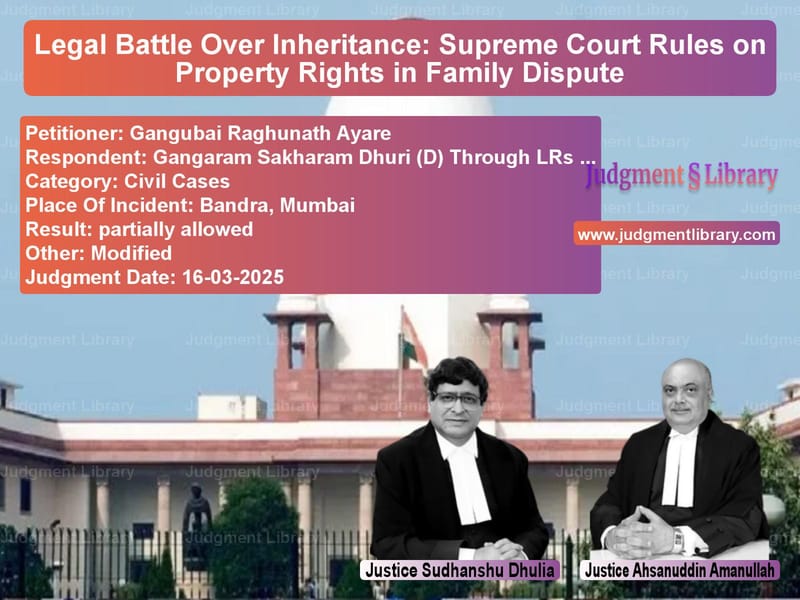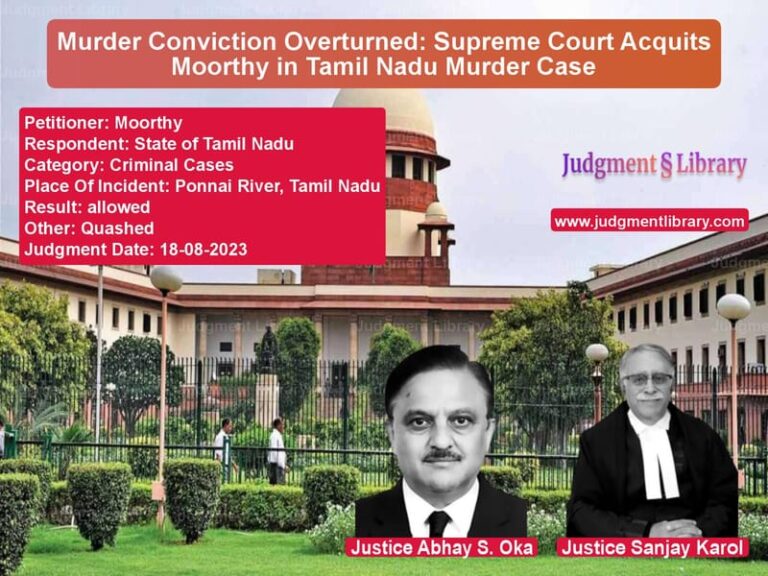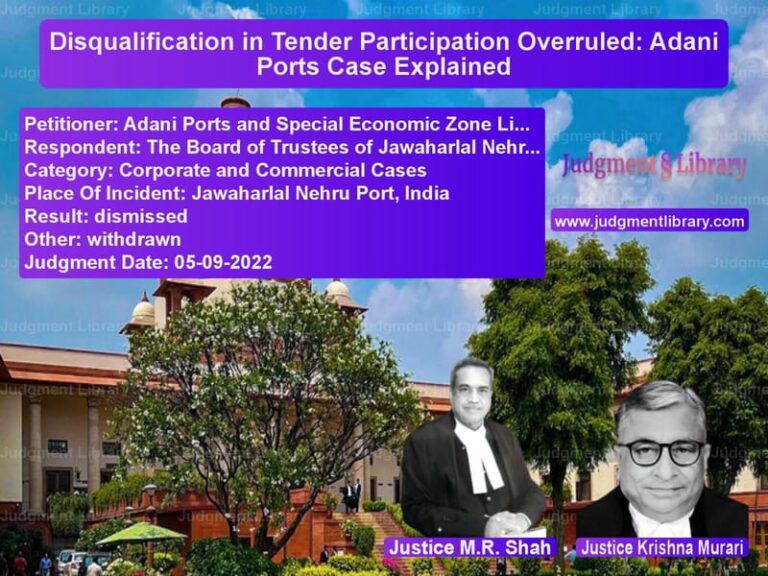Legal Battle Over Inheritance: Supreme Court Rules on Property Rights in Family Dispute
In a significant ruling, the Supreme Court of India settled a long-standing property dispute in the case of Gangubai Raghunath Ayare vs. Gangaram Sakharam Dhuri (D) Through LRs & Others. The Court ruled on the validity of property transactions executed under alleged misrepresentation and clarified the principles governing the partition of inherited properties among legal heirs.
Background of the Case
The dispute revolved around a property situated in Bandra, Mumbai, originally owned by Gangaram Thakoji Shelar. Upon his demise in 1967, his widow Sunderbai, son Vishnu, and four daughters, including the appellant Gangubai, inherited the property as legal heirs.
The issue arose when Vishnu allegedly obtained signatures from his sisters under the pretext of property management and later executed a Relinquishment Deed in his favor. Subsequently, Vishnu sold half of the property to the second defendant through a Sale Deed dated January 10, 1969. The plaintiff, Gangubai, claimed that she was unaware of this transaction until her husband received a letter in 1969 asserting that she was merely a licensee in the property.
Alleging fraud and misrepresentation, Gangubai filed Suit No. 2060 of 1970, challenging the sale and seeking her rightful share in the property.
Legal Proceedings
- Trial Court (1987): Declared the Sale Deed null and void and directed possession of half of the suit property to be handed over to Gangubai.
- High Court (2007): Reversed the Trial Court’s ruling, holding that Vishnu had a 1/5th share, which he could legally transfer. The sale was upheld for that portion.
- Supreme Court (2025): Upheld the High Court’s decision, affirming the validity of the sale to the extent of Vishnu’s 1/5th share but ruling that Gangubai could not be evicted until formal partition proceedings were concluded.
Petitioner’s Arguments (Gangubai Raghunath Ayare)
- The Sale Deed was based on a fraudulent Relinquishment Deed, which was never executed with informed consent.
- As a legal heir, she had a rightful claim to an undivided share in the property.
- The transaction in favor of the second defendant was unlawful and unenforceable.
- Vishnu could not have transferred more than his actual share in the suit property.
Respondents’ Arguments (Legal Heirs of Vishnu & Second Defendant)
- Vishnu, as a co-owner, had the right to transfer his share under the Transfer of Property Act.
- The High Court correctly found that Vishnu’s share was 1/5th, and the sale should be upheld for that portion.
- The plaintiff had no cause of action for possession since she never filed for partition.
- The suit for administration of the estate was not maintainable.
Key Observations by the Supreme Court
The Supreme Court carefully analyzed the validity of the Sale Deed and the rights of co-owners in inherited properties. It ruled:
“A legal heir cannot be dispossessed from the inherited property until the final partition is executed.”
“While an undivided share may be transferred, the actual partition of such share must follow due legal process.”
“A transferee of an undivided share cannot force eviction without a formal partition decree.”
The Court upheld the sale to the extent of Vishnu’s share but directed that the plaintiff’s possession remain undisturbed.
Most Important Verbatim Arguments from the Judgment
“A sale deed cannot confer more rights than the seller himself possesses at the time of execution.”
“A partition suit is the appropriate remedy when multiple legal heirs claim undivided shares in inherited property.”
“No co-owner can be forcibly dispossessed from the shared property unless a final partition order has been passed.”
Final Judgment and Conclusion
- The Supreme Court upheld the High Court’s ruling that the Sale Deed was valid only to the extent of Vishnu’s 1/5th share.
- The plaintiff could not be evicted from the property until formal partition proceedings were concluded.
- The Court encouraged a negotiated settlement or partition to resolve the remaining disputes.
- The lower courts were directed to expedite any partition suit filed in the matter.
This ruling reinforces the principle that inheritance disputes must be resolved through formal partition suits rather than unilateral transactions and eviction claims.
Petitioner Name: Gangubai Raghunath Ayare.Respondent Name: Gangaram Sakharam Dhuri (D) Through LRs & Others.Judgment By: Justice Sudhanshu Dhulia, Justice Ahsanuddin Amanullah.Place Of Incident: Bandra, Mumbai.Judgment Date: 16-03-2025.
Don’t miss out on the full details! Download the complete judgment in PDF format below and gain valuable insights instantly!
Download Judgment: gangubai-raghunath-a-vs-gangaram-sakharam-dh-supreme-court-of-india-judgment-dated-16-03-2025.pdf
Directly Download Judgment: Directly download this Judgment
See all petitions in Property Disputes
See all petitions in Landlord-Tenant Disputes
See all petitions in Succession and Wills
See all petitions in Judgment by Sudhanshu Dhulia
See all petitions in Judgment by Ahsanuddin Amanullah
See all petitions in partially allowed
See all petitions in Modified
See all petitions in supreme court of India judgments March 2025
See all petitions in 2025 judgments
See all posts in Civil Cases Category
See all allowed petitions in Civil Cases Category
See all Dismissed petitions in Civil Cases Category
See all partially allowed petitions in Civil Cases Category







